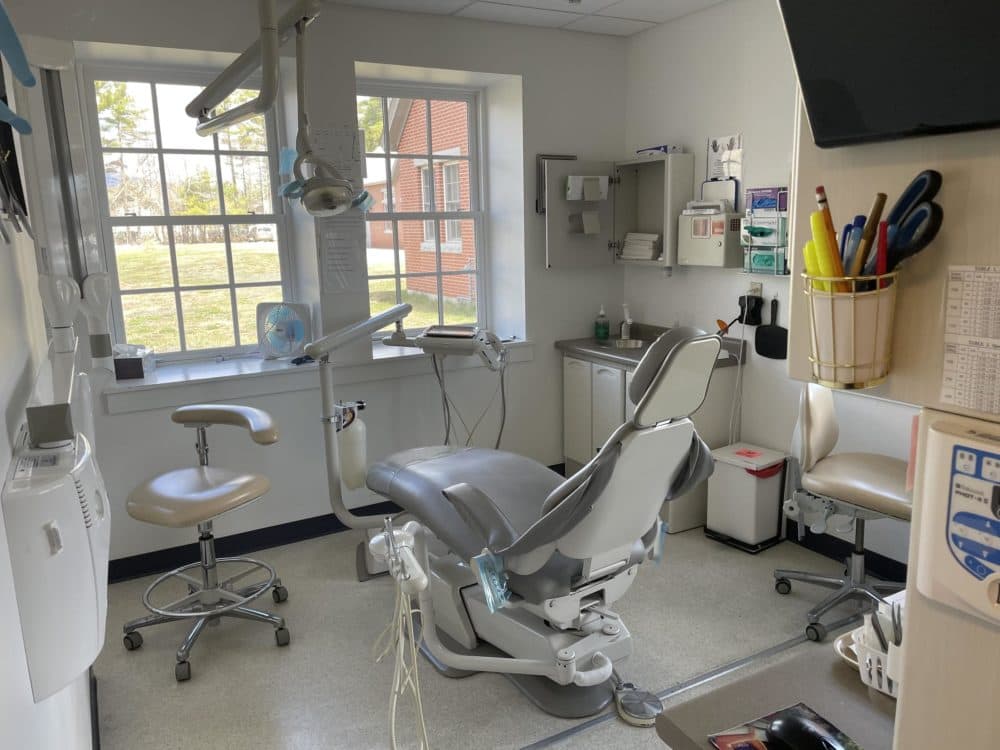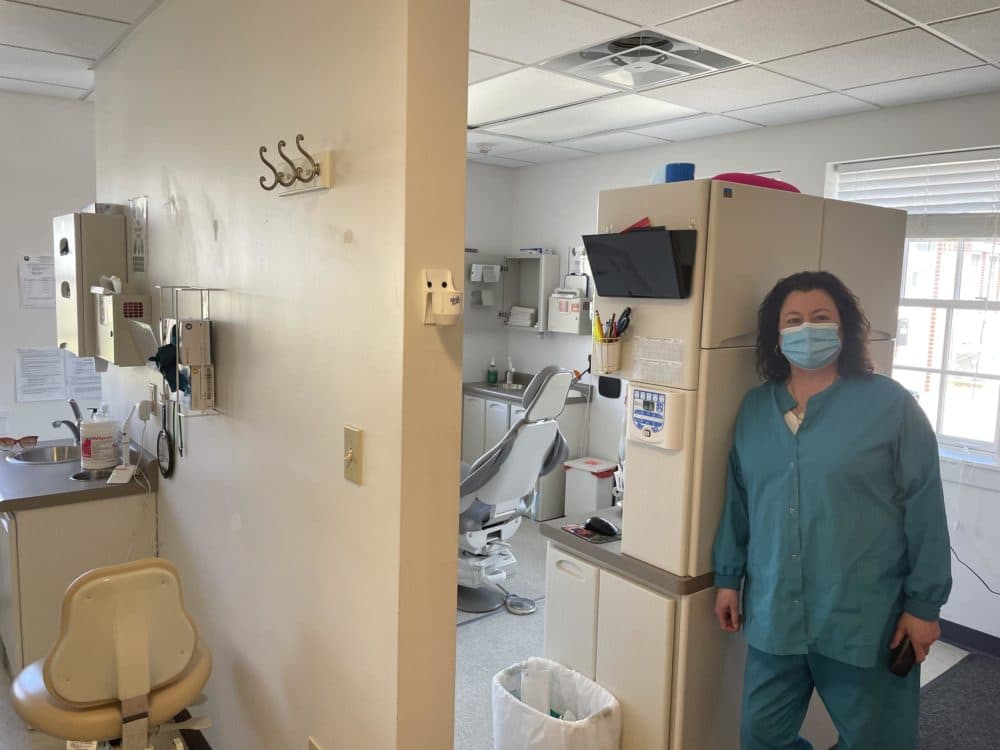Advertisement
In A Small N.H. Town, This Dental Clinic Serves The State's Poor And Uninsured

The COVID-19 pandemic has thrown business operations across the country for a loop. It has also exacerbated long standing inequality. Both have come to a head at one dental center in Tamworth, New Hampshire.
Even a mask couldn’t hide how swollen Jennifer Hill’s face was. Two of her teeth were throbbing.
“I haven’t eaten since Friday,” she said. “And even that was minimal.”
It was clear talking hurt, too. Pain, she explained, comes “anytime your tongue moves in your mouth.”
But Hill had something she wanted to make very clear that day: “If you're poor you don’t deserve to have teeth,” she said.
Hill works as a licensed nursing assistant in home health care. She said she can’t afford routine cleanings on her own, making $25,000 to $30,000 a year with a family to care for.
Hill blames the state’s Medicaid program, which for most adults only covers emergency care, but doesn’t pay for preventative treatment like routine checkups.
Hill put it simply: “They will pull ‘em, they won’t fix ‘em, and they don’t do cleanings.”
The Tamworth Dental Center, where Hill came for treatment, caters to the uninsured and underinsured, offering a sliding scale for services. They see a lot of patients like her.
And in the pandemic, business at the center has skyrocketed.
Christina Ferraro is the director of Clinical Services at Tri-County Community Action Program, the nonprofit that runs the Tamworth Dental Center. She estimates business has increased by around 70%.
Advertisement
Ferraro said that back when the pandemic first hit, dentists could only stay open for emergency services, which the Tamworth Dental Center did. But many practices closed their doors altogether.

At the same time, there was growing concern that hospitals in the state would be overrun with COVID-19 patients.
Ferraro said the Tamworth Dental Center decided to call “around to all the emergency rooms in the state” to lend a helping hand in the world of dental emergencies.
The offer was readily accepted. Ferraro said hospitals and clinics “just started sending us people," which meant "we were busy every day and we worked our normal schedule.”
Decked out in layers of PPE, surgical masks over N95s, all under face shields, Ferraro and her team continued to see patients. In late spring of 2020, they started seeing patients for regular, non-emergency treatment.
Things got so busy, Ferraro said, that retired dentists, or dentists whose practices were still closed, came in to help.
But even now, over a year after the start of the pandemic, business still hasn’t normalized.
Ferraro said the Tamworth Dental Center is “serving the whole state still.” People, she explained, are frequently driving all the way from Rockingham County (which could be around an hour and half drive away).
And when it comes to emergencies, those have continued, too, Ferraro noted. “We’re even doing much more oral surgery than we were.”
But what exactly is still driving those emergencies through Tamworth’s doors?
Ferraro thinks the decision to reach out to hospitals put them on the map and helped grow their patient base.
Then, there’s the pandemic itself.
Office closures and fear of the virus led many Granite Staters to put off preventative care, which, down the road, has meant a pent up demand for services, and some emergencies that could have been avoided.
Sarah Finne is the Medicaid Dental Director for the state's Department of Health and Human Services. “There is definitely a backlog,” she said.
Finne said COVID stress can also cause problems. "One of them," she explained "is tooth grinding and clenching. And so you'll have a lot more patients with headaches, jaw pain, even broken teeth.”
But there’s another factor at play, which has to do with the patient base Tamworth serves, many of whom are on Medicaid.
State data show the number of Granite Staters on Medicaid increased by over 10% during the pandemic. And the number of people on expanded Medicaid increased by 40%.
And while there are nearly 600 dentists and specialists in the state who participate in Medicaid, many offer limited emergency care, and that’s all most Medicaid plans cover for adults.
Finne said Medicaid providers are not spread evenly throughout the state, and there is a statewide shortage of oral surgeons. “If any oral surgeons out there are listening,” she said, only half-joking, “give me a call.”
Even Tamworth doesn’t have an oral surgeon. But they do extractions and some more complicated procedures, so some low-income patients can be sent to them for emergency care.
That’s what Dr. Olga Minukhin, a general dentist at Concord Hospital Dental Center in Laconia, has been doing. Business at her small clinic has been crazy, and she needs somewhere to refer her Medicaid patients for emergency care.
She said many of her old go-to oral surgeons are either booked out for months, have closed, or no longer take Medicaid.
She said she’s grateful for the Tamworth Dental Center.
She also wishes insurance didn’t have to be such a big part of the equation. “You know you're forced to ask a patient what kinds of insurance you have. You're basically forced to do it. I know it's discriminatory, but what else can I do?" she said.
Before the pandemic, Gov. Chris Sununu signed a bill to create a dental plan for adults on Medicaid. Finne, Ferraro and other local providers are hopeful the plan will finally receive funding in this year’s budget. The plan could keep adults in the state healthier and out of emergency rooms by allowing them to access better care.
Dr. Jacob Akers is a dentist at Tamworth. He said the issue of affordability also extends to how emergencies are treated.
“A lot of people can save a tooth by doing a root canal,” Akers explained. “And a lot of them see the cost of it. And they say, ‘No, just rip it out,’ so to speak. That would be probably every day here.”
Getting teeth ripped out is exactly what’s happening to Jennifer Hill. “They changed my antibiotics," she explained as she left, "and I have to come back in two weeks and have two teeth pulled.”
Hill said the pain may cause her to miss more work. Before she got into her car, she reiterated her long standing frustration: “Because you’re poor, you don’t deserve to have teeth.”
This story is part of the New England News Collaborative. It was originally published on New Hampshire Public Radio's website.
This segment aired on June 3, 2021.